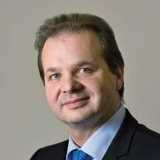The Swiss embassy in Kyiv has been operational again since last Saturday. It had to close shortly after the outbreak of war because the situation was too unsafe. The ambassador and his team had to continue their work from Moldova, Romania and Bern as best they could. Now the Swiss Ambassador Claude Wild is back in Kyiv. He reports on the current situation and future tasks.
SRF News: What did you encounter in Kyiv?
Claude Wild: It was a weird feeling. Because there is a quasi-normal atmosphere in a country that is at war.
You left the embassy shortly after the outbreak of war. They had to destroy files, shred passports and Schengen visas. Do you have to rebuild a lot?
Yes. Our servers need repairs. That’s why we’re working on WiFi at the moment. But this phase is a bit of an interim phase. Because it all depends on the course of the war.

Legend:
Leaving an embassy during a war leaves nothing behind that could fall into the hands of unauthorized persons.
imago images
So are you ready to leave the country again at any time?
Those are all the embassies that have reopened here. We are here with small teams, also with special security. We’re ready for anything.
Why is it important to be local?
In diplomacy, video telephony or telephones are not a suitable tool. It’s about picking up certain information and about the exchange. If you really cultivate relationships, then human contact is the optimum in our job.
What task is Switzerland now pursuing in Ukraine?
We still have our relations with Ukraine. But they must be adapted to Ukraine at war. Although there is a war in Ukraine, all European security has been destroyed. And that’s where we’re affected. There are many concrete operational questions. What are our humanitarian programs doing? Where can you help? What local needs are there? What capacities and security does Switzerland have to provide help where it is needed?
All European security was destroyed.
There are also economic questions and matters. Many investors have lost millions. What’s next for these dossiers? What does refugee care look like in Switzerland? How do you regulate that between the states of Switzerland and Ukraine? These are just some of the dossiers we have.
So you take care of humanitarian tasks and economic issues. Can you describe that to me more specifically? What tasks do you perform?
In Lviv, for example, there were rocket attacks. The water supply was partially destroyed. Because the electric motors that drove the water pumps were destroyed. The manufacturer of these motors is in Switzerland. It’s not that easy to find quick alternatives.
In order to be able to act correctly and quickly, you have to be on site.
How exactly can we help the city of Lviv with the vital water supply? How do we quickly get an alternative for the engines? Who pays them, when and how? Who delivers them? Where are they delivered to? In order to be able to act correctly and quickly in all these questions, you have to be on site. We have two Swiss foreign policy offices here. We have the Embassy in Kyiv and we have the Humanitarian Office in Lviv.
Ukraine faces tremendous devastation from war. Reconstruction will be complex and expensive. What role will Switzerland play in this?
We have been a partner for Ukraine’s transition for a long time. These reform programs will be continued, but adapted to the reconstruction logic. We will also have a conference in Lugano in July. This is dedicated to the reconstruction of Ukraine. In the evening, Federal President Ignazio Cassis will report on this at the WEF in Davos together with the Ukrainian Prime Minister and Foreign Minister.
The conversation was conducted by Simone Hulliger.
